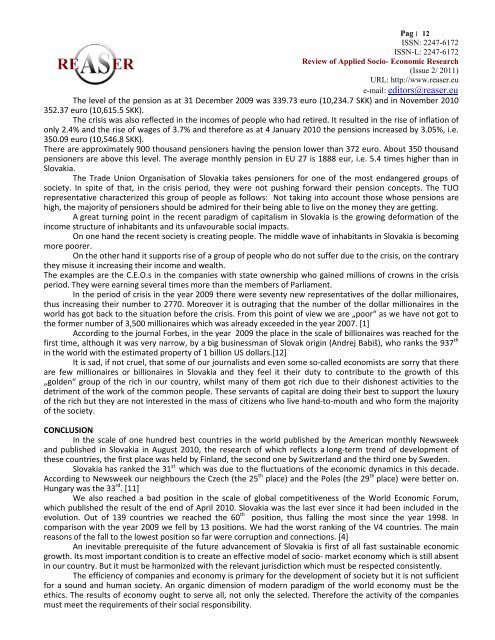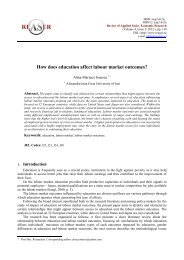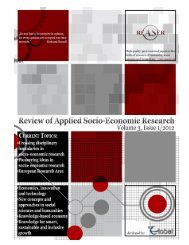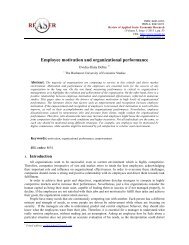Volume 2, ISSUE2/2011 - Review of Applied Socio-Economic ...
Volume 2, ISSUE2/2011 - Review of Applied Socio-Economic ...
Volume 2, ISSUE2/2011 - Review of Applied Socio-Economic ...
Create successful ePaper yourself
Turn your PDF publications into a flip-book with our unique Google optimized e-Paper software.
Pag׀ 12 ISSN: 2247-6172ISSN-L: 2247-6172<strong>Review</strong> <strong>of</strong> <strong>Applied</strong> <strong>Socio</strong>- <strong>Economic</strong> Research(Issue 2/ <strong>2011</strong>)URL: http://www.reaser.eue-mail: editors@reaser.euThe level <strong>of</strong> the pension as at 31 December 2009 was 339.73 euro (10,234.7 SKK) and in November 2010352.37 euro (10,615.5 SKK).The crisis was also reflected in the incomes <strong>of</strong> people who had retired. It resulted in the rise <strong>of</strong> inflation <strong>of</strong>only 2.4% and the rise <strong>of</strong> wages <strong>of</strong> 3.7% and therefore as at 4 January 2010 the pensions increased by 3.05%, i.e.350.09 euro (10,546.8 SKK).There are approximately 900 thousand pensioners having the pension lower than 372 euro. About 350 thousandpensioners are above this level. The average monthly pension in EU 27 is 1888 eur, i.e. 5.4 times higher than inSlovakia.The Trade Union Organisation <strong>of</strong> Slovakia takes pensioners for one <strong>of</strong> the most endangered groups <strong>of</strong>society. In spite <strong>of</strong> that, in the crisis period, they were not pushing forward their pension concepts. The TUOrepresentative characterized this group <strong>of</strong> people as follows: Not taking into account those whose pensions arehigh, the majority <strong>of</strong> pensioners should be admired for their being able to live on the money they are getting.A great turning point in the recent paradigm <strong>of</strong> capitalism in Slovakia is the growing deformation <strong>of</strong> theincome structure <strong>of</strong> inhabitants and its unfavourable social impacts.On one hand the recent society is creating people. The middle wave <strong>of</strong> inhabitants in Slovakia is becomingmore poorer.On the other hand it supports rise <strong>of</strong> a group <strong>of</strong> people who do not suffer due to the crisis, on the contrarythey misuse it increasing their income and wealth.The examples are the C.E.O.s in the companies with state ownership who gained millions <strong>of</strong> crowns in the crisisperiod. They were earning several times more than the members <strong>of</strong> Parliament.In the period <strong>of</strong> crisis in the year 2009 there were seventy new representatives <strong>of</strong> the dollar millionaires,thus increasing their number to 2770. Moreover it is outraging that the number <strong>of</strong> the dollar millionaires in theworld has got back to the situation before the crisis. From this point <strong>of</strong> view we are „poor“ as we have not got tothe former number <strong>of</strong> 3,500 millionaires which was already exceeded in the year 2007. [1]According to the journal Forbes, in the year 2009 the place in the scale <strong>of</strong> billionaires was reached for thefirst time, although it was very narrow, by a big businessman <strong>of</strong> Slovak origin (Andrej Babiš), who ranks the 937 thin the world with the estimated property <strong>of</strong> 1 billion US dollars.[12]It is sad, if not cruel, that some <strong>of</strong> our journalists and even some so-called economists are sorry that thereare few millionaires or billionaires in Slovakia and they feel it their duty to contribute to the growth <strong>of</strong> this„golden“ group <strong>of</strong> the rich in our country, whilst many <strong>of</strong> them got rich due to their dishonest activities to thedetriment <strong>of</strong> the work <strong>of</strong> the common people. These servants <strong>of</strong> capital are doing their best to support the luxury<strong>of</strong> the rich but they are not interested in the mass <strong>of</strong> citizens who live hand-to-mouth and who form the majority<strong>of</strong> the society.CONCLUSIONIn the scale <strong>of</strong> one hundred best countries in the world published by the American monthly Newsweekand published in Slovakia in August 2010, the research <strong>of</strong> which reflects a long-term trend <strong>of</strong> development <strong>of</strong>these countries, the first place was held by Finland, the second one by Switzerland and the third one by Sweden.Slovakia has ranked the 31 st which was due to the fluctuations <strong>of</strong> the economic dynamics in this decade.According to Newsweek our neighbours the Czech (the 25 th place) and the Poles (the 29 th place) were better on.Hungary was the 33 rd . [11]We also reached a bad position in the scale <strong>of</strong> global competitiveness <strong>of</strong> the World <strong>Economic</strong> Forum,which published the result <strong>of</strong> the end <strong>of</strong> April 2010. Slovakia was the last ever since it had been included in theevolution. Out <strong>of</strong> 139 countries we reached the 60 th position, thus falling the most since the year 1998. Incomparison with the year 2009 we fell by 13 positions. We had the worst ranking <strong>of</strong> the V4 countries. The mainreasons <strong>of</strong> the fall to the lowest position so far were corruption and connections. [4]An inevitable prerequisite <strong>of</strong> the future advancement <strong>of</strong> Slovakia is first <strong>of</strong> all fast sustainable economicgrowth. Its most important condition is to create an effective model <strong>of</strong> socio- market economy which is still absentin our country. But it must be harmonized with the relevant jurisdiction which must be respected consistently.The efficiency <strong>of</strong> companies and economy is primary for the development <strong>of</strong> society but it is not sufficientfor a sound and human society. An organic dimension <strong>of</strong> modern paradigm <strong>of</strong> the world economy must be theethics. The results <strong>of</strong> economy ought to serve all, not only the selected. Therefore the activity <strong>of</strong> the companiesmust meet the requirements <strong>of</strong> their social responsibility.








